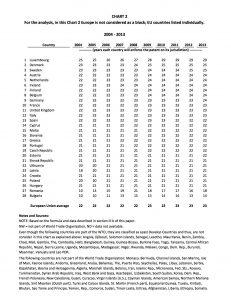To Europe (simulation with each country of the European Union individually).
This is intended as a footnote to this post about the position of the Global North (excluding the US) with TRIPS PLUS ULTRA, from the point of view of Europe specifically, taking into account the particular situation that arises when you are part of a free trade zone as integrated as the European Union.
The following chart is, in turn, a footnote to this first simulation (follow the link). The first simulation was initially presented as an academic paper and is accessible at this post, including further additional explanation. It describes how the proposal we promote would look like if each member of the European Union were considered individually.

Under TRIPS PLUS ULTRA, patents in different countries would have different periods of duration, varying according to the economic capacity of each country. This is possible, discounting for the black market, because different countries or trade regions constitute different markets. Such a scheme would be impossible within Europe, because of the existence of a single market. Nonetheless, it would be interesting to see the reward of generally similar European countries under this proposal if they were considered as individual countries rather than a block. This points to the analogous economic status of most if not all countries of the Eurozone, compared with the sharp economical discrepancies we see among other countries around the world, as shown in these charts.
It would certainly be positive for the European Union in terms of fairness if it were able to adopt this scheme within their borders, although difficult but not impossible to achieve. (Article 36 TFEU however, although meant for temporary measures, does hint at a way to do it.) In this hypothetical patent global scheme it seems only logical that Europe must be considered as a block. Members are part of a unified market and thus not able to have commercial borders. In contrast, Brexit will unequivocally make it possible, discounting black market commerce (which is lamentably always a reality up to a certain extent), to have different periods of protection for patents in the United Kingdom and the European Union.
- The United States and the European Union: political analysis and an analogy
Europe needs to understand that the United States is attempting to organize its social security system, and they desperately need to reorganize some global realities that affect their complex scheme. If Europe acts on its Union’s guiding principles, it would be coherent for it to offer a helping hand to its biggest partner, the US, and to consumers in the developing world as well.
Extending an analogy, the regional inequities we see in Europe (with some countries with much higher income per capita than others), are the same as within the United States. The US, because it is a unified country and not a union of countries, has more tools to address the issue. Nonetheless, the European Union has shown it is capable of creating support systems for fellow member countries when they need them, in various ways. That is what being part of a union means.

